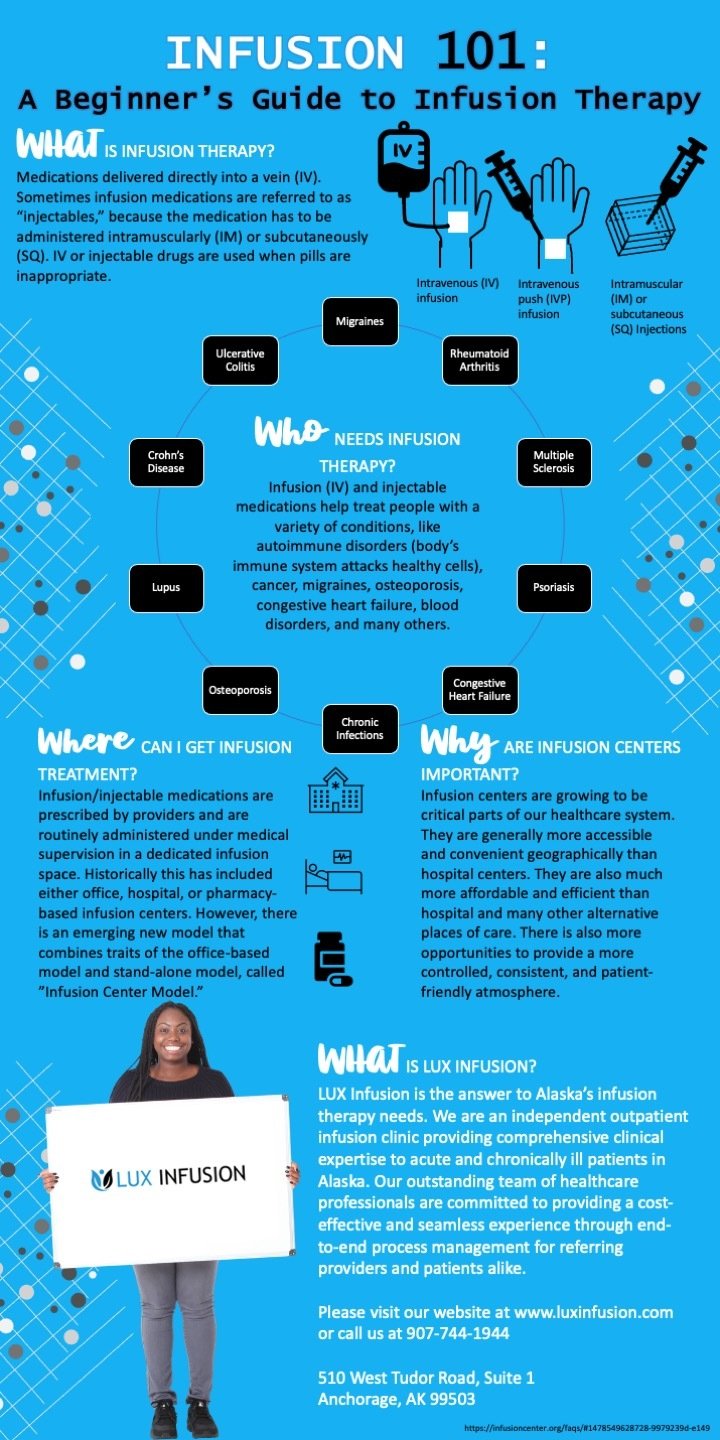Infusion 101: A Beginner’s Guide to Infusion Therapy
What Is Infusion Therapy?
What a great question!
Most people are unclear about what is meant when using the term, “infusion therapy,” but as medicine continues to advance, our general knowledge must as well.
Infusion therapy refers to a medication that is delivered directly into a vein. This route is known as intravenous, or IV.
Sometimes, infusion medications are referred to as “injectables,” because medication must be administered in the muscle, which is known as intramuscular or IM.
However, some medications may also be injected into subcutaneous tissue (SQ), which is closer to the surface of the skin.
All of these routes are utilized in cases where oral pills are inappropriate.
Who Needs Infusion Therapy?
Various IV, IM, and SQ medications are used to help treat people with all types of acute and chronic conditions, particularly those with immune-related disorders, infections, or certain deficiencies.
Autoimmune disorders occur when the body’s own immune system attacks healthy cells. Many autoimmune disorders were once untreatable whereas now there are medications to help.
Patients who may benefit from various infusion/injectable therapy are those that suffer from conditions like:
Migraines
Iron deficiency
Rheumatoid arthritis
Multiple sclerosis (MS)
Psoriasis
Osteoporosis
Lupus
Crohn’s Disease
Congestive heart failure
Chronic infections
And more!
Where Can I Get Infusion/Injection Therapy?
Infusion/injectable medications are prescribed by medical providers and are routinely administered under medical supervision in a dedicated infusion space.
Historically, this has included either office, hospital, or pharmacy-based infusion centers.
However, there is an emerging new model that combines traits of the office-based model and stand-alone model, called the “Infusion Center Model.”
Why Are Infusion Centers Important?
Infusion centers are growing to be critical components of our healthcare system because they are generally:
More accessible and convenient than using hospital-based infusion options
Much more affordable and efficient than hospitals and other alternative sites of care.
In addition, patients who receive care in infusion centers often feel that their care is more consistent, comfortable, and patient-friendly.
BONUS QUESTION: What Is LUX Infusion?
LUX Infusion is the answer to Alaska’s infusion therapy needs. We are an independent outpatient infusion clinic providing comprehensive clinical expertise to acute and chronically ill patients in Alaska.
We have built an outstanding team of healthcare professionals who are deeply committed to providing a cost-effective, seamless experience through end-to-end process management for referring providers and patients alike.
At LUX Infusion, we are obsessed with ensuring each patient we care for is met with top-notch care with additional attention to comfort and convenience. Our patients can enjoy heated massage chairs, warm blankets, made-to-order snacks and beverages, and friendly faces always!
To learn more about our infusion treatments and services or to schedule treatment, just click here or call (907) 744-1944.




